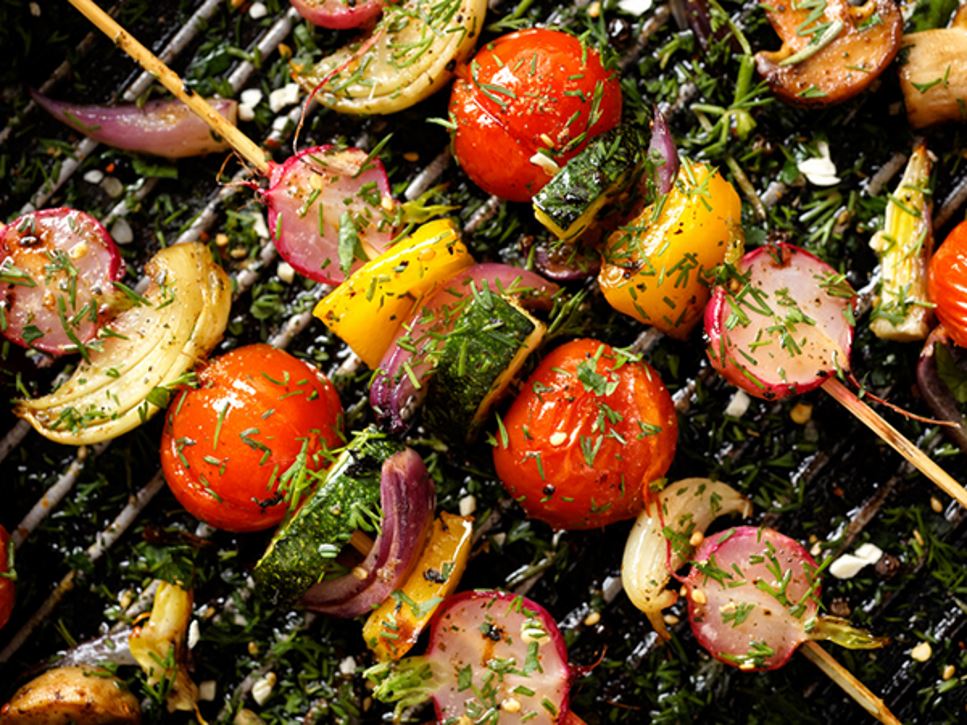The beginning of summer brings the unofficial start of grilling season. For some vegetarians and vegans, however, this means making do at backyard picnics with the same old appetizers or soggy green salads. But barbecues don't have to be a washout for those who don't eat meat.
Classic cookout foods can easily be transformed into delicious vegetarian or vegan fare.
Main Dishes
When hosting, be sure to offer some sort of plant-based protein, which can be as simple as a chilled bean salad! You'll also find meat-free burgers and hot dogs in most grocery stores. Or, if you're feeling adventurous, make your own homemade burgers out of beans, rice, grains or tofu. If you're making chili for meat eaters, simply make another batch without the meat; add extra beans and veggies to thicken.
Side Dishes
From pasta salad and quinoa salad to pickled veggies and pico de gallo, there are lots of plant-based options to serve at your cookout.
Grilled vegetables are satisfying no matter your eating pattern! Marinated and grilled portobello mushroom caps are tasty and offer a savory flavor that can be appealing to vegetarians and non-vegetarians alike. Or skewer mushrooms, peppers, squash and tomatoes, then grill them until slightly charred.
Deviled eggs, potato salad, and macaroni salads are possible food choices for lacto-ovo vegetarians, and can be modified for vegans by altering some of these recipes by substituting certain ingredients with dairy- and egg-free products. Try a vinegar-based dressing for broccoli or green bean salad. Or make a simple chopped salad using canned chickpeas, tomatoes, cucumber and bell peppers.
For a more nutritious chip option, offer guests homemade kale or collard chips. Another traditional favorite is grilled corn on the cob.
Desserts
You can't go wrong with fresh seasonal fruit such as watermelon slices and an assortment of berries. If you're looking for something more indulgent, soy, almond, cashew and coconut milk-based ice creams command more shelf space in today's frozen food aisle, and for good reason — they taste absolutely delicious! And if you want to join in for some s'mores around the campfire, gelatin-free marshmallows guarantee your place. Grilling? Try peaches, mangoes, pineapples, bananas and other fruit. The heat caramelizes their natural sweetness.
On the Road
New vegetarians and vegans often find it difficult to ask hosts about food — what will be served and how it will be prepared. Most hosts, however, want their guests to enjoy themselves, so let them know you follow a vegetarian or vegan diet. You may be pleasantly surprised with their response. Some hosts will even go so far as to prepare dishes that are vegetarian- or vegan-friendly or at least won't mind if you bring your own food.
If most dishes include meat, dairy, eggs or cheese, offer to bring food to share with the crowd so you won't go hungry. As a courtesy, let the host know, as there may already be a crowded refrigerator or limited oven space, in which case, you can bring your own cooler or decide on a different recipe.
You'll also want to follow good food safety practices. Bacteria grow rapidly between 40 and 140 degrees Fahrenheit, and vegetarians and vegans aren't immune from food poisoning. Keep perishable foods in the refrigerator until you're ready to leave, and then keep cold foods chilled in an ice-filled cooler or by packing with frozen gel packs. If you’re bringing foods that are already hot, transport them in a thermal container to help them retain their heat. These foods should be reheated to a minimum internal temperature of 165° F once you arrive.
Bacteria multiply at room temperature. For foods like eggs and dairy products, keeping these items chilled on ice while serving can help keep the temperature down. Otherwise, any perishable foods that are left out at room temperature for more than two hours (or just one hour if the temperature is over 90ºF) will need to be discarded. The same goes for cut fresh fruits and vegetables, as well as cooked food.
If refrigeration is unavailable to you or it will be difficult keeping foods cold, consider packing non-perishable foods that don't need refrigeration such as whole fruits and vegetables (wash before eating), chips, bread, crackers, nuts, peanut butter and condiments.
Find a Nutrition Expert
Looking for credible nutrition information and recommendations? The Academy of Nutrition and Dietetics' network of credentialed food and nutrition practitioners are ready to help!
